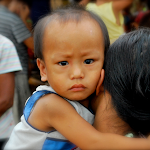12
Oct 2010
“Stop Global Warming. Wear a Condom.”
 “Stop Global Warming. Wear a Condom.” The slogan, coined by Mechai Viravaidya, Thailand’s “Mr. Condom”, always gets a chuckle. If you stop and think about it though it makes a lot of sense. Maybe too much sense. Surely halting Global Warming couldn’t be that easy.
“Stop Global Warming. Wear a Condom.” The slogan, coined by Mechai Viravaidya, Thailand’s “Mr. Condom”, always gets a chuckle. If you stop and think about it though it makes a lot of sense. Maybe too much sense. Surely halting Global Warming couldn’t be that easy.
From clean coal to carbon trading, the solutions that companies and governments propose are often technology heavy and years away from being implemented. What if part of the solution was simply to have fewer consumers? The idea is not a new one. In fact at the first Earth Summit in Brazil in 1993, the main drivers of global destruction were found to be overconsumption and overpopulation. Planning your family and having fewer children is not as exciting an idea as solar powered cars but it can be an easier goal to attain.
The question of how to curb population growth is different for each country as there are so many variables. Here in the Philippines, the 12th most populous country in the world, the answer is simple. Provide women with the education to decide if they want to use contraception, and give them easy access to contraception if they decide they want it. We don’t believe one should come without the other. Providing contraception without information on how to use it would be negligent and could harm the health of women and children. To provide only the education but not the products, like Manila’s Mayor Lim is planning to do is not particularly helpful – it does not help poor women who decide they want contraceptives but can’t afford to buy them.
It is poorer Filipino families that are most at risk. The ones that cannot afford contraception, much less more children. Middle class and upper class couples here enjoy the power to determine their family size. As a result, their children enjoy higher levels of education, better health care, and generally a higher quality of life. Larger family sizes make it more difficult for poor families to break the cycle of poverty.
And when we feel the effects of climate change, it is the poor families that rely directly on the environment for a living that are hardest hit. When the oil spills in the ocean, fishermen are the ones who lose their livelihood and their way of life. When landslides occur it is often people in very remote, poor and underserved areas that are hardest hit. A 7.0 earthquake hits New Zealand and two are seriously injured. A quake of similar magnitude hits Haiti and 230,000 die. The difference? Population and wealth. Haiti just happens to have the highest fertility rate in the Western Hemisphere.
 The responsibility of providing families with the opportunity to plan their families falls on a range of shoulders. Traditionally it is the government’s responsibility. Due to religious convictions regarding contraception and a blurred line between church and state, that is not an option in the Philippines. Although she blocked reproductive health legislation, former president Gloria Macapagal-Arroyo admitted using contraception early in her marriage, but has refused to come out and endorse artificial methods of family planning because of the influence of the Catholic Church. Current President Benigno Aquino III has pledged support for providing family planning methods to poor Filipinos but has faced a storm of criticism from the Catholic Church. Whether the government will ever play a meaningful role in reproductive healthcare in the Philippines remains to be seen. In the meantime, foreign aid from countries such as Australia, the US and Sweden are helping, and there are many maternal health groups that are filling the void left by government inaction, including Roots of Health.
The responsibility of providing families with the opportunity to plan their families falls on a range of shoulders. Traditionally it is the government’s responsibility. Due to religious convictions regarding contraception and a blurred line between church and state, that is not an option in the Philippines. Although she blocked reproductive health legislation, former president Gloria Macapagal-Arroyo admitted using contraception early in her marriage, but has refused to come out and endorse artificial methods of family planning because of the influence of the Catholic Church. Current President Benigno Aquino III has pledged support for providing family planning methods to poor Filipinos but has faced a storm of criticism from the Catholic Church. Whether the government will ever play a meaningful role in reproductive healthcare in the Philippines remains to be seen. In the meantime, foreign aid from countries such as Australia, the US and Sweden are helping, and there are many maternal health groups that are filling the void left by government inaction, including Roots of Health.
 $20 provides one woman with contraception for a year. That could buy her enough time to nurse an older child until a healthier age and allow her time to save money for her next child. If you would like to empower her by giving her the choice to make these very important decisions for herself, donate here.
$20 provides one woman with contraception for a year. That could buy her enough time to nurse an older child until a healthier age and allow her time to save money for her next child. If you would like to empower her by giving her the choice to make these very important decisions for herself, donate here.






Recent Comments